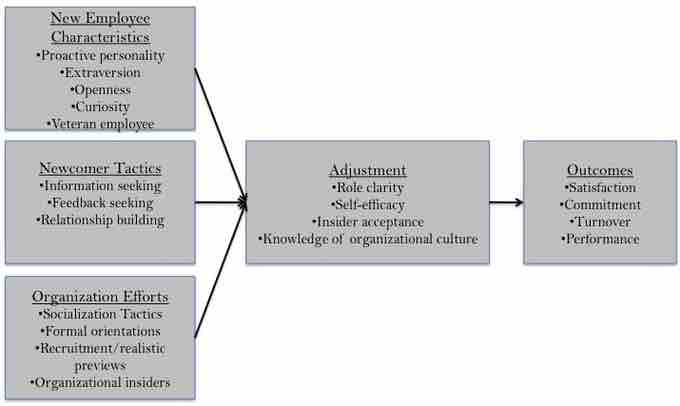The workplace performs its socialization function through onboarding. This is the mechanism through which new employees acquire the necessary knowledge, skills and behaviors to become effective organizational members. Tactics used in this process include formal meetings, lectures, videos, printed materials, or computer-based orientations. Research has demonstrated that these socialization techniques lead to positive outcomes for new employees including higher job satisfaction, better job performance, greater organizational commitment, and reduction in stress. These outcomes are particularly important to an organization looking to retain a competitive advantage in an increasingly mobile and globalized workforce .
Employees with certain personality traits and experiences adjust to an organization more quickly. These traits are a proactive personality, the "Big Five" traits, curiosity and greater experience levels. "Proactive personality" refers to the tendency to take charge of situations and achieve control over one's environment. This type of personality predisposes some workers to engage in behaviors like information seeking that accelerate the socialization process. The Big Five personality traits—openness, conscientiousness, extraversion, agreeableness, and neuroticism—have been linked to onboarding success. Specifically, new employees who are extraverted or particularly open to experience are more likely to seek out information, feedback, acceptance and relationships with co-workers.
Curiosity also plays a substantial role in the newcomer adaptation process. It is defined as the "desire to acquire knowledge" that energizes individual exploration of an organization's culture and norms. Individuals with a curious disposition eagerly seek out information to help them make sense of their new organizational surroundings, which leads to a smoother onboarding experience. Employee experience levels also affect the onboarding process. For example, more experienced members of the workforce tend adapt to a new organization differently from a college graduate starting his or her first job. This is because seasoned employees can draw from past experiences to help them adjust to their new work settings. They may be less affected by specific socialization efforts because they have (a) a better understanding of their own needs and requirements at work and (b) are more familiar with what is acceptable in the work context.
Employees that build relationships and seek information can help facilitate the onboarding process. Newcomers can also speed up their adjustment by demonstrating behaviors that assist them in clarifying expectations, learning organizational values and norms, and gaining social acceptance. Information seeking occurs when new employees ask questions in an effort to learn about the company's norms, expectations, procedures and policies. Also called networking, relationship building involves an employee's efforts to develop camaraderie with co-workers and supervisors. This can be achieved informally through talking to their new peers during a coffee break, or through more formal means like pre-arranged company events. Research has shown relationship building to be a key part of the onboarding process, leading to outcomes like greater job satisfaction, better job performance and decreased stress.

Organization Socialization Model
A model of onboarding (adapted from Bauer & Erdogan, 2011).